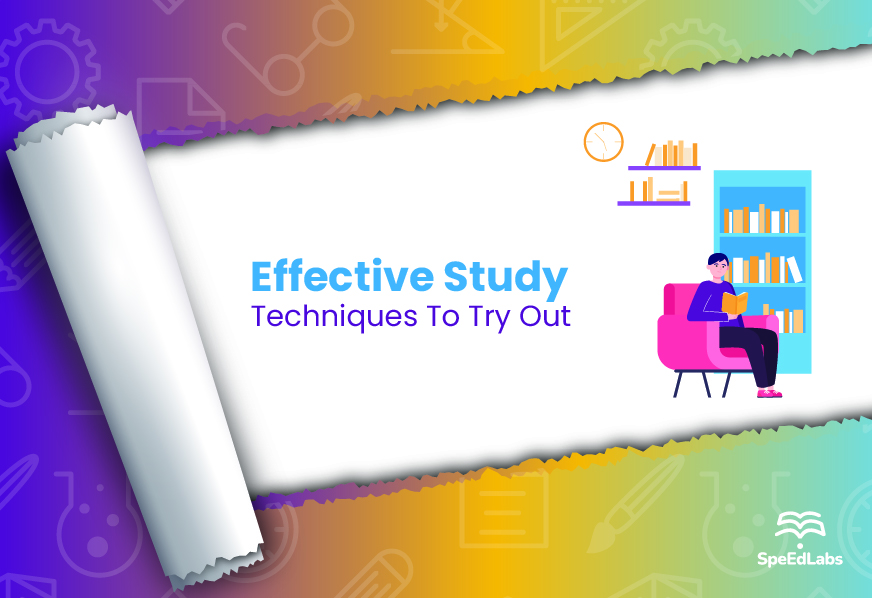It is necessary to develop effective time management and study systems that help one retain maximum information.
Daily study habits and are they up to the mark?
Do you ever get the feeling that your study habits aren’t up to par? Do you ever question what you may be doing differently in class or on examinations to improve your performance? At some point in time or the other, improvement in study habits is crucial to take the maximum benefit out of those habits.
Techniques that are very effective for best study
It is not at all your fault as a student if you are concerned about your ability to memorize a vast quantity of information in a short time or if you get demotivated by your study regimen. It just implies you need to improve your study techniques. Effective study strategies are essential for developing a thorough comprehension of the topic and avoiding rote memorization. This blog assists students in comprehending many efficient study approaches that they may use to improve their academic performance and achievements.
The following study techniques are very effective, and one must follow them:
Silence isn’t always a good thing: The heading may sound weird, but it is true. For some people, pleasant background music is beneficial, while for others, it is highly distracting. You must have seen people listening to classical sounds before or while doing studies. Hence, decide where you choose to study. Noise isn’t always bad for everyone as some can concentrate more in noisy environments.
Write Notes with different colours: Coloured writing is a fun method to keep track of what you’re learning. It also aids in the examination and prioritization of the most crucial concepts. Avoid using numerous colours, but you can select 2-3 colours for different purposes. If you like, you may use different colours for the headline, primary text, and drawing lines or diagrams. Warmer hues “raise attention and evoke enthusiasm and information,” according to the study.
Take charge of your schedule: For a proper timetable, adhere to the following points:
- Plan your week’s itinerary on the same day each week. You can choose any day (Mostly on weekends).
- Determine how many hours you have to finish your assignment by looking at your schedule.
- Check to see if you can complete your to-do list in the time you have available. If not, make necessary amendments accordingly.
- Make a plan for the next day before going to bed each night. You will be more productive if you wake up with a plan. Also, make a note of important dates on your calendar. Let’s say, for instance, the day of submission of an assignment or the day of an assessment.
Some other study techniques include:
Before you start studying, have some exercise: Exercise can help you not only battle exhaustion. It also boosts your energy levels, so do some simple exercise before you sit for studying so that your body can remain charged throughout the day. When you engage in any form of strenuous physical exercise, blood rushes to the brain. It means that simply 20 minutes of physical activity before studying can help you refocus your skills and increase your attention.
Tweak your settings: You should not stick to a single environment or place. Change it continuously if it is not serving your purpose. There are places on every campus having a different aura, and they may help you more positively. You should be able to study in a variety of locations on and around campus. That way, you’ll be able to discover the ideal study place no matter where you are. For some students, the playground can be a perfect place to study, whereas, for others, the library can play a role. Time also matters, and hence choose wisely. Do not study at 01:00 am in the night if your friend is doing so as you may perform far better in the morning time so choose wisely.
The Feynman Method: In basic terms, the Feynman Technique states that attempting to explain an idea in our own words can help us grasp it much more quickly. It is simple to implement. Firstly, write about the topic you are studying in your own words on a piece of paper, and later on, verify it from the textbook. If you are missing something, write it again, and if it is too complex, try to make it in simple language. Hence, the Feynman method helps to simplify a topic step by step.
Questions are on your side: Numerical and analytical problems should be taken into consideration by a student when taking technical courses. Subjects like Physics and mathematics require an understanding of concepts as approaching a problem without proper concepts is irrelevant. Make a comprehensive list of issues from the course materials and lectures while preparing for examinations. Work through the numerical and explain how and why the steps work.
Mapping of the brain: Mind Mapping is a technique for organizing thoughts. It is a diagramming method that helps with a graphical arrangement. In the centre of a blank paper, write a word. Then you write main topics and keywords that are closely related to the fundamental notion. Other similar concepts will continue to develop.
Key Takeaways
Students who employ effective study techniques may believe that their time and effort are more worthwhile. Also, it may boost their confidence, competence, and self-esteem. It will help those students who are fearful about exams and will increase their memorization power.
Also published on Medium.
